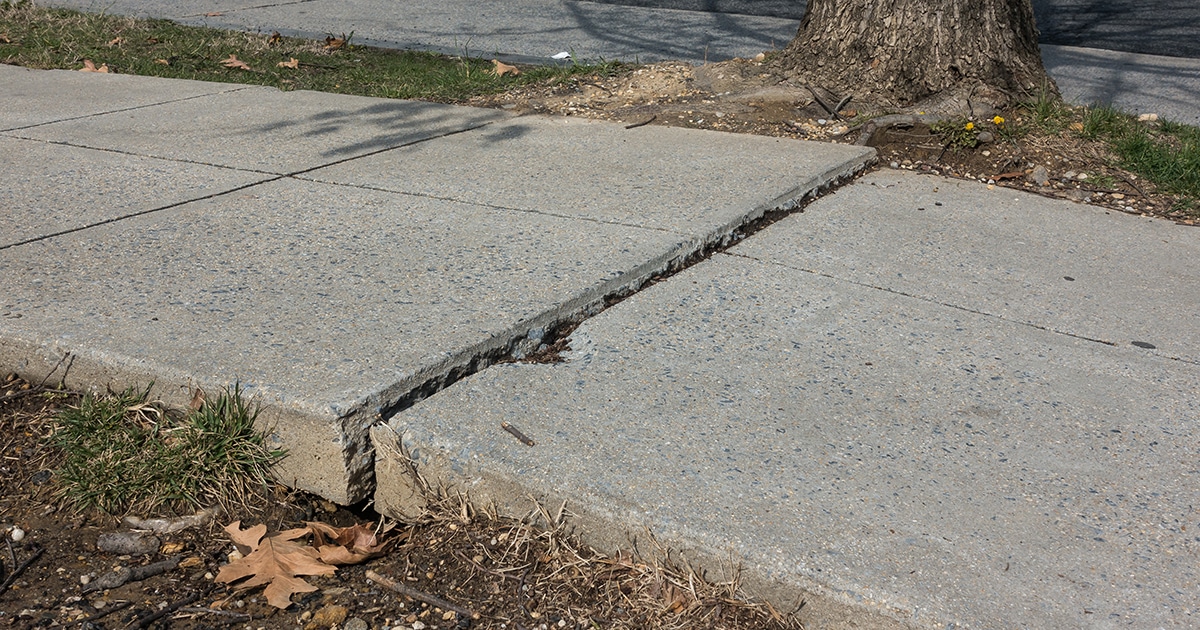What Happens if I Slip and Fall on a Sidewalk in Chicago?
As a Chicago resident, you likely do your fair share of navigating around ice and snow piled up on sidewalks during our bitterly cold winters. After all, even if there is a municipal code on the books requiring property owners to maintain the sidewalk outside their home or business, many do not. While shoes with good soles on them can minimize your chances of slipping and falling, it is still possible for an accident to occur.
Throughout the remainder of this article, we’ll highlight laws that apply to snow and ice removal and address liability when accidents occur, resulting in injuries. This insight should give you a better idea of what you can expect to happen if you slip and fall on a sidewalk in Chicago.
City of Chicago Municipal Code Related to Snow and Ice Removal
According to the City of Chicago, Municipal Codes 4-4-310 and 10-8-180 spell out how both property occupants (including lessees and tenants), property managers, and owners are mutually responsible for ensuring the sidewalks surrounding their premises are free from snow and ice. These codes describe how this rule involving the cleaning of snow and ice applies to anyone that maintains grounds or has a lot adjacent to any public way or space as well. While most homeowners or businesses must only ensure the sidewalk in front of their property is free from snow and ice, anyone with a corner lot must maintain all publicly-accessible sides.
The city requires compliance with their shoveling code seven days a week. Chicago requires a property owner or its tenants or residents to clear a path that’s at least five feet wide and to also ensure crosswalk ramps are clear. The city requires removal of any snow falling between 7 a.m. and 7 p.m. to be removed by 10 p.m. Property owners, residents, and tenants must remove snow falling between 7 p.m. and 7 a.m. by 10 a.m.
A Chicago administrative hearings judge assesses fines of anywhere between $50-500 when property inhabitants or owners fail to shovel as required of them. A few hundred citations are issued annually.
Liability When a Slip and Fall on a Sidewalk Occurs in Chicago
Slipping and falling on an icy or snowy sidewalk can result in serious injuries for which you should receive immediate medical attention to ensure you haven’t suffered life-threatening injuries that aren’t yet obvious. If you have serious injuries in your fall, then your medical bills can be expensive. It’s imperative that you know your legal rights following this type of accident. The responsibility falls on your shoulders to prove a property owner’s liability for the incident.
In Illinois, a law handles claims against municipalities called the Local Governmental and Governmental Employees Tort Immunity Act (ILCS). This law outlines the types of claims you can bring against the Illinois government and that the claim must establish willful and wanton misconduct.
Typically, cities or municipalities are immune from lawsuits. Still, if you can prove that the government willfully disregarded the safety of others, you may be able to recover damages. To prove willful and wanton misconduct, you’ll likely need the help of an experienced personal injury lawyer. Our attorneys can help.
What You Should Know About the City of Chicago’s Responsibility for Public Sidewalks
For the City of Chicago to be liable for an injury on a public sidewalk, the plaintiff must prove that the municipality had “notice” of the defect and a reasonable amount of time to correct it. This means that the city had constructive notice of the deficiency.
Sidewalks are constructed in slabs, and a buffer of fibrous material and tar is at the ends. This layer allows the sidewalk to expand and contract due to temperature changes throughout the year. Therefore, sidewalks will still develop cracks and other defects over time. These flaws, coupled with snow and ice, can make for particularly hazardous sidewalks where trips, slips, and falls occur.
The De minimus rule is a legal concept that a plaintiff can’t recover damages for an injury so minor it wouldn’t be worth the time and effort to bring a lawsuit. The De minimus law is “rooted” in a municipality’s duty to maintain the safety of its sidewalks; this concept has since expanded to cover private owners and possessors of land. As stated, the conditions must be worth the time and effort to bring forth a lawsuit; if you trip on a sidewalk crack and the height is two inches or less, the court will find in favor of the De minimus rule. However, if the city has a responsibility to keep premises safe from snow and ice and fails to do so, then you may have a valid claim.
Sorting Out Liability for a Slip and Fall in Chicago
A city like Chicago is only legally responsible for a slip and fall on the street or sidewalk if its lack of care led to the accident. In addition, just because there were slippery conditions on the sidewalk does not mean that the city or town is legally responsible. The sidewalk would have had to be unreasonably unsafe to warrant negligence allegations. You must prove the city was negligent by showing that it knew or should reasonably have known about the unsafe condition.
The most common slips, trips, or falls on public streets or sidewalks involve ice and snow. Remember, it is usually the building owner’s responsibility to clear away any ice or snow on sidewalks in front of private residences or commercial buildings. The city is only responsible for clearing away ice and snow on sidewalks in front of public buildings or areas. Therefore, if you slip on ice or snow on a public sidewalk in a residential area, the city will not be held responsible; your claim will almost always be against the property owner and their homeowners’ insurance policy.
However, if you fall on ice or snow in a business district, your claim could be filed against the municipality or the premises owner, depending on your city’s rules. With any slip, trip or fall, you should take pictures of the accident scene and any visible injuries you might have as soon as possible. The conditions that led to your injury could change in a moment and proving your point would be difficult without that evidence in hand.
What Is Comparative Negligence?
It is likely that when you file a personal injury lawsuit for a slip and fall accident, the municipality or property owner will deny their involvement while trying to prove that you were also negligent. In other words, they will try to show that you were partially to blame for the accident, which is called “comparative negligence.” Comparative negligence allows for the apportionment of responsibility and prorated damages to go to the plaintiff.
Illinois follows the modified comparative negligence standard in premises liability cases like slip and fall ones. This means that the plaintiff’s percentage of the fault must be less than the defendant’s for the plaintiff to receive compensation. This amount is typically 50%; if the plaintiff is more than 50% at fault, they are not entitled to any damages.
The Slip and Fall Statute of Limitations in Chicago, Illinois
You might wonder if there’s a statute of limitations that applies to Chicago slip and fall cases. In Illinois, the statute of limitations for personal injury cases is two years from the date of your accident. However, an action against a municipality has a one-year limitations period. Also, depending on certain factors, the rule could toll or pause, giving you more time to file, which is why it’s best to speak with an experienced personal injury attorney. Your lawyer can help you understand the statute of limitations and whether exceptions apply to your case.
What Should You Do if You Slip and Fall on a Sidewalk in Chicago?
If you have been injured in a slip and fall on a sidewalk, the first thing you should do is seek medical attention, even if your injuries seem minor. You never know, you could have suffered a head or brain injury that will cause your health to deteriorate in time. After a doctor has seen you, reach out to an experienced Chicago personal injury lawyer at Krzak Rundio Gorman, Injury Attorneys.
The sooner you contact a lawyer, the better. Your attorney can handle the challenging steps of preserving evidence and investigating the accident. In addition, you’ll need to file a report with the property owner or the City of Chicago regarding your accident. Your attorney can also help with this process.
An experienced personal injury lawyer will be able to help you navigate the legal process and ensure you are fairly compensated for your injuries. Time is of the essence, so don’t hesitate to reach out to an experienced Chicago lawyer for a free consultation.











